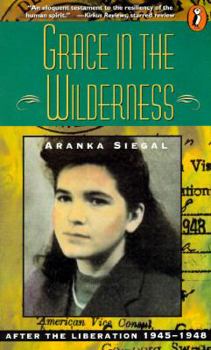Grace in the Wilderness: After the Liberation 1945-1948
(Book #2 in the Piri Series)
Select Format
Select Condition 
Book Overview
This follow-up to Upon the Head of the Goat recounts Piri's experiences as a patient in a Red Cross hospital, a student in a Swedish school of refugees, and as the adopted daughter of a loving... This description may be from another edition of this product.
Format:Paperback
Language:English
ISBN:0140369678
ISBN13:9780140369670
Release Date:January 1994
Publisher:Puffin Books
Length:220 Pages
Weight:0.30 lbs.
Dimensions:0.4" x 4.3" x 7.1"
Age Range:12 to 17 years
Grade Range:Grades 7 to 12
Customer Reviews
5 ratings
Good, but missing something
Published by Thriftbooks.com User , 20 years ago
(Actually, this is a 4.5 star rating.)This is a very memorable book, like the first book 'Upon the Head of the Goat' (I read them both at age fifteen, in the spring of 1995, haven't reread them yet, and yet can still vividly rememeber a lot of names, details, and events from both as though I'd only finished reading them yesterday). However, in hindsight it seems as though something is missing, and not just all of the friends and family members who were killed by the Nazis. A lot of sequels to books that were about the Shoah, whether fiction or memoir, or whether the characters were in camps, ghettos, in hiding, or just continually on the run, are kind of a letdown. A lot of intense things happened before, what with daily deprivations, increasing regulations, friends, neighbours, and relatives murdered, taken into ghettos, camps, prisons, and death marches, but the sequels to such books seem more like a routine tale of life after the War, no constant "What's going to happen next?" now that the danger is past and the Allies have assumed protective control of the European nations. Though this book, while being guilty of being mundane in comparison with what went before, is one of the better sequels.The early part of the book is the most compelling, during the final days Piri and her older sister Iboya spend at Bergen-Belsen before the liberation. Piri is very sick and has to spend a long time in the makeshift hospital the Allies set up, and then she and Iboya are off to Sweden to begin new lives, along with their friend Dora (who lost her mother about six months after they were taken to the camp they were in, and is now an einer allen, or one alone in the world) and the two Berger girls, the daughters of the woman who pulled Piri into line with them after she had been selected to stay behind in the camp since she was so weak. Mrs. Berger switched Piri with another woman who had been marching with them in the fünfferreihe (row of five prisoners). They meet a lot of fellow survivors in Sweden, including Herschel, who becomes Dora's boyfriend, and David, who becomes Piri's boyfriend for a short time. Piri and Iboya also discover that one of their four sisters, Etu, has survived too. Etu was living in their old house in Hungary, along with her new husband Geza, but now she wants to go to Palestine, where David and several of his friends are also going.Maybe it's shellshock or denial, but in hindsight I don't really recall some of the strong emotions displayed in other after-the-war narratives present in Piri or Iboya, at least not for long stretches of time, just an occasional moment of reflection that they almost didn't have one another, or remembering back to something awful that happened, like how Piri lost her best friend Judi. I know that no news was usually bad news, and the longer there was no news, the worse it probably was, but where is the frantic searching for their other relatives that I see so often in other memoirs of this sort,
A fascinating story. What happens next?
Published by Thriftbooks.com User , 22 years ago
I just finished reading this book and enjoyed, though I did skim some parts that moved a little slowly. Overall, it is an excellent, intimate portrait of a young womans thoughts and concerns after leaving a concentration camp in WWII. It has issues universal to all-- growing up, loyalty yet resentment of an older siblings care, letting go, beginning again, love vs attraction. It also has some thoughts about being a surviver and a Jew and what it would mean to leave her Jewish life behind now that she survived the Nazis...
powerful stuff
Published by Thriftbooks.com User , 24 years ago
Other reviews by young adults suggest there is no action and that it is boring, but they are missing the true meaning. This book stirs up emotion that makes you want to reach into the pages to help Piri. It makes you want to help like the Rantzows, and you hope there are more people like the Rantzows in our own society. Very moving.
powerful stuff
Published by Thriftbooks.com User , 24 years ago
Other reviews by young adults suggest there is no action and that it is boring, but they are missing the true meaning. This book stirs up emotion that makes you want to reach into the pages to help Piri. It makes you want to help like the Rantzows, and you hope there are more people like the Rantzows in our own society. Very moving.
A compelling story of what life is like after the Holocaust
Published by Thriftbooks.com User , 25 years ago
Aranka Siegal describes life after the Holocaust in this amazing novel. After all of what Piri (the main character) had was lost during the Holocaust, she and her sister Iboya must not look back at those horrible memories, but they must start a new life. It's a story about moving on to a different world and leaving behind all the loved ones. It's a story few lived to tell.





